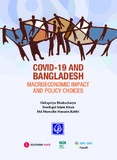| dc.contributor.author | Bhattacharya, Debapriya | |
| dc.contributor.author | Islam Khan, Towfiqul | |
| dc.contributor.author | Hossain Rabbi, Md Mursalin | |
| dc.coverage.spatial | Bangladesh | en |
| dc.date.accessioned | 2022-03-28T14:11:57Z | |
| dc.date.available | 2022-03-28T14:11:57Z | |
| dc.date.issued | 2021-12-26 | |
| dc.identifier.citation | Bhattacharya, D.; Islam Khan, T. and Hossain Rabbi, M. Md. (2021) 'COVID-19 and Bangladesh Macroeconomic Impact and Policy Choices', Research Paper, Dhaka: Centre for Policy Dialogue (CPD) | en |
| dc.identifier.uri | https://opendocs.ids.ac.uk/opendocs/handle/20.500.12413/17261 | |
| dc.description.abstract | Bangladesh, like most of the countries in the world, had to restrict mobility and economic activities to tackle the spread of the COVID-19 virus. Indeed, the pandemic has been exerting pressure on the economy through both global and domestic shocks leading to a detrimental impact on major macroeconomic correlates of the country. The present study urges that Bangladesh will need to pursue a countercyclical fiscal policy stance in the face of deceleration in aggregate demand. The study further maintains that greater fiscal resources should be directed towards those people, households and enterprises having a higher propensity to consume and invest. From this perspective, the study strongly advocates for direct cash transfers, food support, and enhanced public expenditures in health and education rather than a general increase in public expenditures and subsidised credit flow.
Using Computable General Equilibrium (CGE) model, the study presents ex-ante economic-wide impact analyses of two expansionary fiscal policy interventions. Doubling government transfers to lowincome household categories is expected to have a greater impact on the real consumption of poorer households. In contrast, a 50 per cent increase in government expenditure for health and education will have a greater positive impact on real GDP and export. In view of the trends of the last decade, the study concludes that it is not the lack of resources, rather the limited capacity of the government agencies which poses the major challenge in pursuing an expansionary fiscal policy in the country. | en |
| dc.language.iso | en | en |
| dc.publisher | Centre for Policy Dialogue (CPD) | en |
| dc.rights.uri | https://www.ids.ac.uk/wp-content/uploads/2021/05/Latest_IDSOpenDocsStandardTermsOfUse_CC_BY.pdf | en |
| dc.subject | Finance | en |
| dc.subject | Health | en |
| dc.title | COVID-19 and Bangladesh Macroeconomic Impact and Policy Choices | en |
| dc.type | Other | en |
| dc.rights.holder | Copyright © Centre for Policy Dialogue (CPD) | en |
| dc.identifier.externaluri | https://cpd.org.bd/publication/covid-19-and-bangladesh-macroeconomic-impact-and-policy-choices/ | en |
| rioxxterms.funder | Default funder | en |
| rioxxterms.identifier.project | Default project | en |
| rioxxterms.version | VoR | en |
| rioxxterms.funder.project | 9ce4e4dc-26e9-4d78-96e9-15e4dcac0642 | en |

